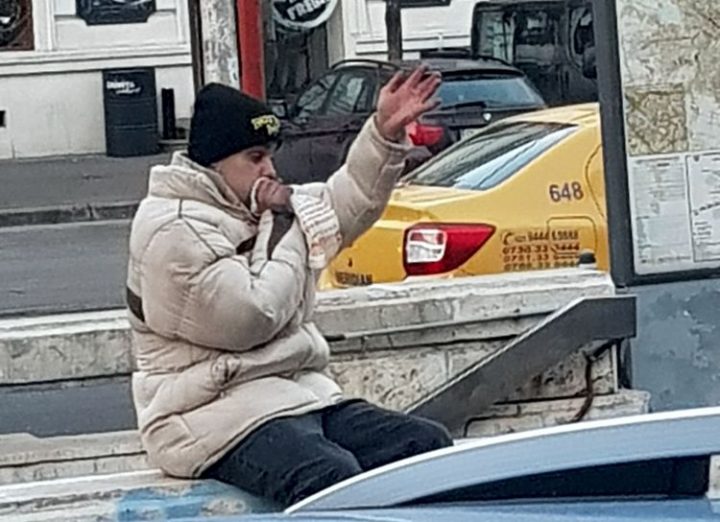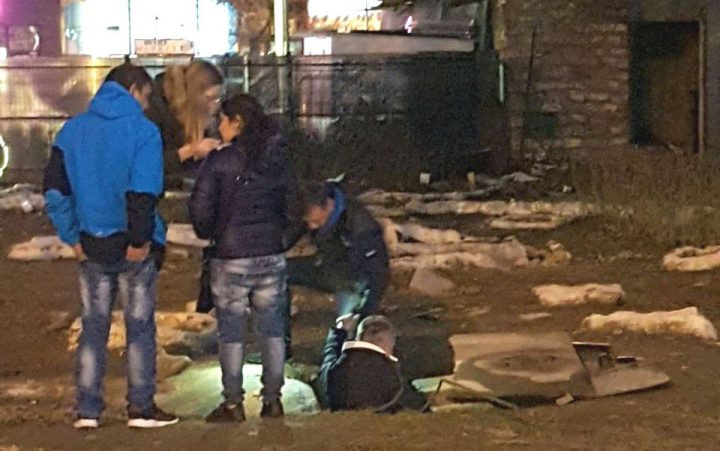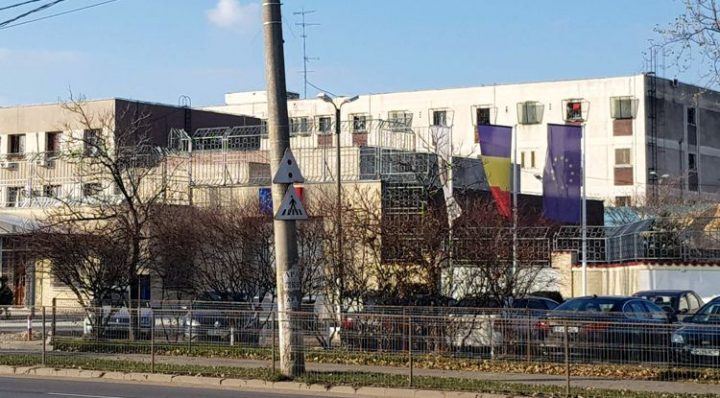Eleven years after joining the European Union, Romania is trying to clean itself up, but poverty and corruption are still in control. Only Bulgaria, among EU member states, is below Romania on the poverty scale.
Right in the centre of Bucharest, outcasts live underground in the former heating tunnels of the Romanian capital.
Daniel and Matthias wanted to know what kind of conditions people in the European Union still have to live in. And they wanted to help, provide them with the essentials, show that there is solidarity, even if misery is not always knocking on our door, as it did, when the waves of refugees arrived in Germany.
They knew the fact that the Romanian administration is corrupt, the young couple were aware of the fact that homophobia in Eastern Europe can take bizarre proportions. However, they would never have imagined what a nightmare was to come.
In August 2014, there was an offer to fly to Romania for 15 euros. The two spontaneously decided to visit the capital for a few days. Upon arrival at Bucharest railway station it was immediately clear that the scandalous reports from the media were almost harmless compared to the reality encountered.
Behind one of the exits it stank terribly, it was a mixture of foot-sweat, urine and a caustic lacquer. Directly on the busy station forecourt, next to a public clinic, people crawled every minute from the various holes in the streets. Some helped each other to inject a substance, right in front of the eyes of the young people living there, the population, and the police.
But most of them held a plastic bag in front of their mouths. In the small bags, a substance called Aurolac was repeatedly refilled: a silver paint that has been used for decades to suppress hunger, poverty and lack of prospects. This drug results, in the case of prolonged exposure, to heart and brain diseases and it damages the respiratory tract. Under the influence of the vapours, children sometimes display self-harming behaviour, for example, by cutting themselves on their arms.

Aurolac user in front of the Bucharest North Railway station (picture: Daniel Mundin)
Before the eyes of the adults there stood also little girls and boys, who started their day with sniffs instead of breakfast, a shower or school attendance.
The Romanian population knows this sight. But instead of helping, the gaze turns away from misery. Sniffily, people pass by day in, day out, some insult the poorest of the poor. The population is resigned to this “problem”. These everyday images, however, are not an isolated case in the country.
The frightening pictures from Romanian orphanages, after the end of the Nicolae Ceausescu regime, of neglected children in their own faeces and rotten straw, and rocking from side to side apathetically are unforgotten. These children are grown ups today and many of them live in former heating ducts and sewers under the ground. They have encountered the next generation of bedraggled children and adolescents and together they form a life and suffering community in the underbelly of the Romanian capital.
Matthias and Daniel took pictures and often filmed the everyday life of the people there. They returned to Germany and reported to their politically active friends about this misery on the edge of the EU, published photos and wrote about the subject.

Homeless people standing around one of the entrances to the underground labyrinth in the centre of Bucharest (Picture: Daniel Mundin)
On their second visit, the two were spoken to by some of the heating tunnel inhabitants. The people were curious and the two were accepted, in the middle of the ghetto in front of the station.
Financially, they could not contribute much support, but they brought warm clothes with them, cooked together with the homeless and made it possible for them to wash themselves. In this way, they created trust and through conversations they tried to reduce the consumption of the paint drug by these young people at least temporarily. After this visit they kept contact via Facebook.
Pictures of the conditions in the heart of an EU member state capital have gone around the world in recent years and German media have also reported on it several times. The fact that Matthias and Daniel on the one hand denounced the grievances and also tried to help as far as possible, caused displeasure with authorities and also opened up opportunities for members of the Romanian Information Service SRI (successor organization of the Securitate) and the local police to enrich themselves financially.
People in contact with the same-sex couple from Germany were beaten to lure the two back to Romania as soon as possible. Meanwhile, the Romanian public prosecutor’s office invented a fake criminal record against them, with the help of the director of a state-owned homeless institution.
The young people had to sign statements according to which Matthias and Daniel were accused of having sexual contact with them. For this to be a criminal offense, the age of the adolescents had to be reduced in the statement, as all the young people involved were older than 15 years, the age of consent in Romania. A circumstance that would later be confirmed in court. In addition, the two were accused of marijuana consumption which can still be punished with imprisonment in Romania.
Due to the requests of the young people, the two decided to visit Bucharest once more in June 2015 and to bring some relief supplies. Daniel and Matthias visited the young people, they bought groceries together, cooked and spent time together in the city and in a rented apartment. They were watched by the police and members of the SRI. Since this suveillance did not lead to the desired result, one of the youngsters, at that time 16 years old, was handed a backpack equipped with a video camera and told to place it in the apartment. He was ordered to seduce the two Germans into sexual acts and to capture it on camera.
The teenager refused and fled from the officials with the prepared backpack. However, the police caught him again and forced him to return to the apartment the next day with his backpack. This he did placing the backpack in the corner of the room.
When after 3 days there had been no offence, the police decided to storm the apartment at 6 o’clock in the morning with masked civil servants to arrest Daniel and Matthias.
Such an action is not an isolated case in Romania. The EU country has been condemned several times in the past by the European Court of Human Rights, for using illegal entrapment or sting operations with the involvement of Agents Provocateurs (For example: Judgment of the Court of Justice Against Romania concerning two Germans who were also victims of these methods: Toran and Schymik v. Romania).
Several people entered the apartment by force, but they did not identify themselves as police. Matthias and Daniel were ripped out of bed and thrown on the floor.
The two were arrested, they did not understand what for because the reasoning was in Romanian. They were repeatedly beaten by partially masked police. Daniel was threatened with a machete and Matthias had a loaded gun held to his head and both had their lives threatened.
The two were made to stand against a wall with handcuffs behind their heads for more than 1 ½ hours, they were insulted, threatened, punched in the stomach and on the head, and the Romanian word for “gay” was repeatedly used.
As a reason for their first incarceration, just the word “PERVERS” was written in capital letters on the paperwork.
Separated from each other, they did not know for five months how the other was doing. In pre-trial detention, the two experienced torture and undignified treatment (Article 3 ECHR – prohibition of torture). They first went through various notorious prisons in Bucharest with names such as Arest Central, ArestPolitiaSectia 5 and finally also to the so-called Penitenciarul Bucuresti Rahova among others where they were subjected to attempted sexual abuse, daily discrimination, death threats and physical violence. They were blackmailed by officials, guards and dangerous criminal inmates.
They suffered greatly under the inhumane conditions of detention and were held for long periods of time with seven other inmates in a cell no more than 10 metres squared. Sufficient physical hygiene, clean clothes, etc., were not possible. Toiletries, toilet paper, bedding, mattresses and a shower were not available. They had no access to medical care and were isolated from each other and from the outside world for months.
During this time, they were continuously exposed to daily noise. To prevent the inmates communicating with each other, a radio station was broadcast over the loudspeakers in front of the cells for a full 14 hours in deafening volume. Throughout the night, the cries of young people suffering from hunger, drug deprivation or self-harm could be heard.
When a fire broke out on their floor, because an inmate had set his mattress alight in protest at the inhumane conditions, the two had to wait almost an hour in their cells, full of black and poisonous smoke, despite cries for help. The fire department was not alerted for fear of negative reporting, detainees had to extinguish the fire with water.
The relevant staff at the German Embassy were unwilling to do their work and assist them. Here, too, they experienced prejudice, even though there was sufficient evidence of their innocence. When relatives in Germany denounced an Embassy staff member for denial of consular assistance and other crimes to the German police, he was very quickly sent into retirement.
During the almost two years of pre-trial detention, the two defendants were repeatedly brought before the court. They were never provided with an interpreter with even a rudimentary knowledge of German. They could not choose their lawyer and they were never really heard in court. They were denied the right to self-defense.
Addresses, telephone numbers of the constantly changing state-appointed public defender, and even their names were not communicated to them, even a conversation with them was prevented. However, in the prison, guards distributed business cards of so-called lawyers. They called on the two families to pay 10,000 euros in bribes. After than, the two could be released in connection with a deal with the prosecutor, which included a partial confession. It later turned out that these lawyers had no right to conduct criminal trials in Romania. Without the help of their families in Germany, the two would not have survived, as they were indiscriminately exposed to arbitrariness.
Finally, the true motive for the illegal and judicially unauthorized “stool pigeon action” was revealed. Believing that the two Germans and their families were able to pay significant sums of money, they hoped for a “lucrative business”. Their homosexuality made them, the masterminds were convinced, easy targets. The Romanian press gratefully took up the false allegations and defamed Daniel and Matthias in public, the prejudgement was perfect.
Since the two persistently refused to sign confessions, the prosecution had no evidence, and the witnesses accused of having committed sexual acts turned out to be over 15 years of age during the alleged act, there has been no verdict or acquittal in the trial even today.
Meanwhile, Daniel and Matthias have documents, phone recordings, surveillance audio and video files, and other evidence that incriminate Romanian authorities. These documents reveal scandalous conditions in the police and judiciary of the EU state of Romania as well as ill-treatment in homes for homeless youth.
In February 2017, the two were finally released from pre-trial detention after 20 months and put under house arrest and were not allowed to leave the rental apartment at any time. Compliance was repeatedly monitored by the police with random visits, including in the middle of the night. In January 2018, house arrest was lifted without explanation, because of the ongoing process which is still not at an end. They were still not allowed to leave the country.
Daniel and Matthias pressed charges repeatedly both in Romania and in Germany. In Romania, this was never investigated, or if investigated, the investigation immediately stopped, as in the case of the attempted sexual abuse of Daniel, although there were witnesses and the perpetrator made a partial confession.
Most German authorities refuse, even now, to investigate too. But as in the case of Daniel and Matthias, the financial aspect of trade relations between Germany and Romania seems to be more lucrative and more important than two lives.
Although Romania is regularly condemned by the European Court of Human Rights for the practice of torture and inhumane treatment (ECHR Art. 3) and various other violations and non-compliance with the European Convention on Human Rights (Romania Convicted – Queeramnesty), this has no real consequences.
So, after 11 years of EU membership, in terms of the rule of law, corruption, poverty reduction and respect for human rights, little has changed in Romania. What’s the point, if even the European Convention on Human Rights is not much more than a paper tiger?
Today the two live again in Mecklenburg-Vorpommern and fight the psychological, physical and financial consequences of their detention in Romania. But the subject haunts them. They want to write about the injustice that has befallen them and others, and they want to talk about the desolate human rights situation and the discrimination and persecution of homosexuals, as well as about the lack of diligence and duty of care by the State with respect to the protection of children and minors in Romania.
(Fotoreportage by Daniel Mundin)
Sources :
Romania –Torture in Europe (http://torture-prison.eu)
Children in the Bucharest sewers – ARD (https://www.youtube.com/watch?v=GY2YkQ1dVGU)
Life in the underground world – people in sewer tunnels in Bucharest (https://www.youtube.com/watch?v=mVsbE8dU20E)
Under the asphalt – Life of the outcast in Bucharest (https://www.stern.de/panorama/weltgeschehen/bukarest–unter-dem-asphalt—das-leben-der-ausgestossenen-7311310.html)
Overcrowded cells and inhuman conditions (http://www.deutschlandfunk.de/rumaenischehaftanstalten-ueberbelegte-zellen und 724.de.html?dram:article_id=341399)
Judges in Strasbourg stigmatise conditions of detention in Romania
(http://www.dw.com/de/stra%C3%9Fburger-richter-prangern-zust%C3%A4nde-in-rum%C3%A4nischen-gef%C3%A4ngnissenan/a-38579286)
Penitentiary system in Romania needs new rules and regulations. (http://www.dw.com/de/rum%C3%A4niens-gef%C3%A4ngnissystem-braucht-dringend-neue-regeln/a-2019975)






